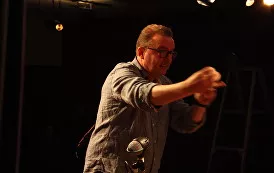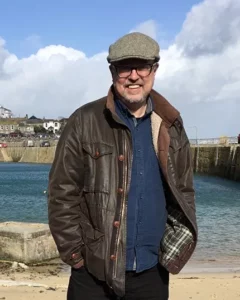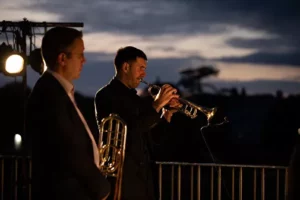
Part 2 MARK STATMAN: MEXICO AND THE POETRY OF GRIEF AND CELEBRATION
Part 2 of my interview with Mark Statman looks closely at Mark’s Latin American poetic influences, his life in Mexico and ends with an extract


i interviewed composer, baritone and conductor Clive Whitburn who has often performed with major orchestras at venues such as the Royal Albert and Festival Halls and the O2 Arena. Clive plays the oboe, guitar and sitar; he is the founder and managing director of New Network Singers.
Leslie: Can you trace for us the development from childhood onwards of your fascination with different types of music and soundscapes?
Clive: I was born in the 50s in a Devon terrace house. My dad was a music teacher and some of my earliest, pre-school memories are hearing him play the piano downstairs and being taken to the theatre to see my mum and dad in a production of The Mikado. Dad conducted a lot of local operatic societies and choirs. I thought music was just something everyone did. I sang in the Cathedral voluntary choir from age 8 to about 14. As kids we were besotted with 60s pop – I remember asking for bongos for my birthday because the Rolling Stones used them on TV. I think I was about 9 when my sister and I formed a pop group and wrote our first songs. In the mid – late 60s our teenage band was heavily influenced by progressive bands and experimental music. My best mate Pete designed and built an early synthesiser based on oscillator circuits published in “Practical Electronics” magazine. He also built an amazing light show using headlamp reflectors we collected from scrap yards. Musically there was lots of improvisation, I was making tape loops going between them around several tape recorders, sometimes around broom handles to make longer loops. It was all about experimentation and creativity. I think I just absorbed influences from all over the place and played around in my own way.
I studied music and composition at Trent Park College in London and managed to persuade various groups of friends to perform my music. It was still experimental in those days; sometimes, electronic or using voices in fresh ways and combining them with orchestral instruments and scrap-yard percussion. I started teaching, to pay the rent while I got a composing career off the ground. Somehow teaching took over and it wasn’t until I retired that I went back to more full-time composing. I don’t have any one style, I’ve written serial music, musique concrete, easy listening, folk and rock songs, orchestral and ensembles. All over the place really – but I kind of like that. My music is more easily accessible these days. Not sure why.
Leslie: The stories you tell through your music often have contemporary relevance, while drawing on other histories/traditions. Can you give us a few examples, please, of how you combine these approaches? Why do stories matter to you in music (I’m thinking of that old-fashioned critical objection to programme music as ‘narrowing’)?
Clive: I don’t find programme music at all narrowing. I love narrative and the moments in time that that creates. I am hugely passionate about social justice, and equality. I love people, diversity and openness and I get angry at inequality and prejudice. So those themes feature a lot. I’m probably a bit of a political bore. AS well as modern music, I love the classical music tradition, but I am aware that it also has an elitist side. That’s one reason why I like to collaborate with visual artists. Collaborations always enhance the performance. They improve accessibility and broaden the audience. I often try to use my music to explore important issues and make myself and others ask questions. I love sacred music (some of the best music ever written) but I’m an atheist so that can be a paradox. In “Who is my Neighbour”, for A Capella choir, I set very well know Biblical texts which preach compassion and love for others alongside the devastatingly awful and chilling statistics of the numbers of refugees who were drowning trying to reach safer places to build their lives. In “To Those Who Pass Through My City”, for choir and strings, I set a very moving poem by Dalal Al Myrchid, who had to abandon her home in Syria with her young children at the height of the destruction in Syria. Her focus on tiny personal, family details brings the reality of the tragedy into stark focus. I was honoured that she agreed to let me set her poetry.
Other stories are just fascinating in themselves. On Twitter, I came across an amazing collection of found messages in bottles from the late 19th and early 20th Century catalogued by the author Paul Brown in his book “Messages from the Sea”. As soon as I read them, I could hear them as a song cycle. “Messages from the Sea” for soprano, baritone, harp and piano, relates a shipwreck, a confession to murder, a fraud, and a birth at sea, all using the words thrown over-board in bottles. For me, music and stories just work well together.
Leslie: I really like Fast Ride on a Short Machine How did you initially compose and then work with your performers to bring off this piece? What parts required the closest attention in rehearsal?
Clive: I’m so glad you like Fast Ride on a Short Machine. I had the opportunity to write a piece for performance by the extraordinarily talented and highly regarded Riot Ensemble who invited members of New Music Brighton, a composers’ collective, to write pieces lasting just 90 seconds, for particular combinations of instruments. My piece is for marimba, ‘cello and bass clarinet. At the time I’d written a lot of slow music, so I wanted to write something really fast. At speed, my piece should just be playable in 90 seconds. It’s fast and it’s short so I couldn’t resist a title which misquotes one of American composer John Adams’ most famous pieces “Short Ride on a Fast Machine”. It’s a musical ‘dad joke’ and a tribute. The version on my website substitutes the cello with violin, and is one of several performances by F Plus, a wonderful young new music ensemble in America. I’ve never been at a rehearsal of this piece – I’m told the performers found playing it fast enough the most challenging aspect, particularly getting that the quick unison passages in sync, especially where they pick up speed.
Leslie: If I was present at some of your site-specific musical performances, what would I experience? How were these musical pieces put together?
Clive: Placing musicians around the audience in different ways is endlessly fascinating. Performing in an orchestra or choir, you hear the music in completely different way to being in the audience with the musicians in front of you and I like to explore that. I composed “Between the Aisles” for a range of different sized flutes, performed at the front, back, central and side aisles of a church or theatre so that the audience is surrounded by the music. The performers move around. In 2012, I wrote a piece for a brass quintet to be performed on a rooftop with 3 additional trumpets on nearby rooftops. “Music for Rooftops” was inspired by Antony Gormley’s rooftop figures in London and Richard Wilson’s coach on the edge of the roof of the De La Warr Pavilion in Bexhill. As I looked at those pieces I could hear what trumpets calling to each other from roof to roof would be like. It turns out that that was a complicated and expensive piece to put on, and it wasn’t until 2020 that I managed to get Arts Council Funding to bring it to fruition, performed a year later by Onyx Brass, the UK’s leading Brass Quintet, with 3 additional trumpets. The audience sat at ground level below Eastbourne’s Congress Theatre and new Welcome Building as the music echoed across the void above them. The music swirled and ricochet about, as the sun went down, enhanced by the evening bird sounds.

“Music for Rooftops” also has a narrative for each of the three movements. It’s not so much programme music as a concept which helps me direct what I want to write and develop a theme. To share and enhance that narrative with the audience, we projected specially created art-work, devised by Cliff Crawford in his virtual reality studio, just below the musicians. Writing these answers to your questions, Leslie, made me wonder if there’s a connection with this back to the prog rock lightshows of my teenage years? I certainly find collaborating with visual artists stimulates my thinking and helps me develop my writing.
Leslie: The human voice and brass instruments figure quite a lot in your works. Why?
Clive: This is probably because of my own experiences as a performer. I’ve sung in a lot of choirs and been lucky enough to do so with some of our most famous orchestras under the most acclaimed conductors of our time. So, I’ve been immersed in the classical choral repertoire. I think this has developed my love for melodic line and texture. When younger, my main instrument was the oboe. I think I understand singers and wind instruments better than other instruments.

Leslie: What are the secrets of conducting your own work with a choir or an instrumental group?
Clive: I love conducting. It really is a privilege and delight, when a deep communication between performers is established and together you work out what works best and bring the dots on the page to life, especially for the first time.
So … secrets? I guess it’s that it’s in rehearsal that the real work takes place. It’s about working together so that the performers have a shared understanding of how the piece should go. There’s almost infinite scope for interpretation and it’s the conductor’s job to help bring about or find that shared understanding. If a piece is well rehearsed, the conductor can sometimes be superfluous in performance. I’ve watched some of the best conductors hardly moving in performance – just providing occasional glancing encouragement.
That said, I really love it when someone else is directing my music. They can often find things I didn’t know were there! That’s probably the best feeling. The composer isn’t always the best person to conduct their own work!
If anyone wants to listen to some of my music there are links on my website: Home | clivewhitburn.com
Next week, I ask author Frank Parker about writing about Ireland and colonial history.
ABOUT LESLIE TATE’S BOOKS:

Part 2 of my interview with Mark Statman looks closely at Mark’s Latin American poetic influences, his life in Mexico and ends with an extract

I interviewed international poet and translator Mark Statman about Volverse/Volver, his 14th published collection. Mark, who has won national arts awards, is Emeritus Professor of Literary

I interviewed Lisa Dart, finalist in the Grolier, Aesthetica and Troubadour Poetry Prizes and author of The Linguistics of Light (poems, Salt, 2008), Fathom (prose

I interviewed writer Julia Lee Barclay-Morton about her experience of autism. Julia began as an experimental dramatist in New York, moving to the UK to

I interviewed Gillean McDougall from Glasgow, who edited the collaborative projects Honest Error (on Charles Rennie Mackintosh and his wife Margaret Macdonald) and Writing the
| Cookie | Duration | Description |
|---|---|---|
| cookielawinfo-checkbox-analytics | 11 months | This cookie is set by GDPR Cookie Consent plugin. The cookie is used to store the user consent for the cookies in the category "Analytics". |
| cookielawinfo-checkbox-functional | 11 months | The cookie is set by GDPR cookie consent to record the user consent for the cookies in the category "Functional". |
| cookielawinfo-checkbox-necessary | 11 months | This cookie is set by GDPR Cookie Consent plugin. The cookies is used to store the user consent for the cookies in the category "Necessary". |
| cookielawinfo-checkbox-others | 11 months | This cookie is set by GDPR Cookie Consent plugin. The cookie is used to store the user consent for the cookies in the category "Other. |
| cookielawinfo-checkbox-performance | 11 months | This cookie is set by GDPR Cookie Consent plugin. The cookie is used to store the user consent for the cookies in the category "Performance". |
| viewed_cookie_policy | 11 months | The cookie is set by the GDPR Cookie Consent plugin and is used to store whether or not user has consented to the use of cookies. It does not store any personal data. |